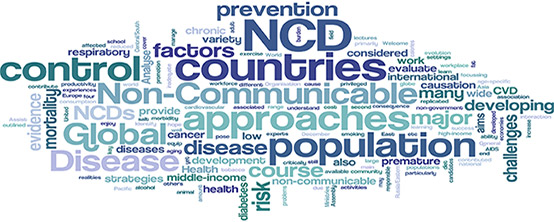
Jan 25, 2017
On 25 January 2017, EBC and MEP Aldo Patriciello (Italy) host an AF-Related Stroke Policy Series Workshop in the European Parliament in Brussels. Moderated by Peter O’Donnell of Politico, the workshop focuses on highlighting the importance of pre-screening and early detection of AF to reduce the threat of stroke and features expert speakers in both AF and Stroke.
18% of strokes are associated with Atrial Fibrillation—the most common heart rhythm disturbance. The early detection of previously unknown arrhythmias, such as AF, can enable patients to receive timely and effective diagnosis and treatment in order to avoid possible future onset of stroke. (more…)

Jan 24, 2017
Written by Luke N Allen, Andrea B Feigl
DOI: https://dx.doi.org/10.1016/S2214-109X(17)30001-3
The global health community does not spend much time on branding, which perhaps explains why existing classifications for the three largest groups of diseases are both outdated and counterproductive. The first Global Burden of Disease study1 described infectious diseases, non-communicable diseases (NCDs), and injuries. This grouping reflected a predominantly infectious disease burden in low-income and middle-income countries, which has since tilted towards NCDs. A name that is a longwinded non-definition, and that only tells us what this group of diseases is not, is not befitting of a group of diseases that now constitute the world’s largest killer. (more…)

Jan 22, 2017
Stroke can lead to ongoing communication problems, but recovery is often possible.
The source: medicalnewstoday.com
Written by Yvette Brazier
Every year in the United States, more than 795,000 people have a stroke, according to the Centers for Disease Control and Prevention. Furthermore, the United Kingdom’s Stroke Association note that 1 in 3 people will experience communication problems after a stroke.
Unfortunately, we often judge people on how well they communicate. From the outside, a person who has difficulty speaking may appear to have difficulty thinking, too, but this is not necessarily true. (more…)

Jan 18, 2017
by Jennifer Thomsen | 17.1.2017 |published on eso-stroke.org
Interview with a Stroke Survivor who had stroke at 34
By Francesca Romana Pezzella (Italy) and Anita Arsovska (Macedonia)
Diana Wong Ramos is a 39 year old stroke survivor, whom we met during the SAFE (Stroke Alliance for Europe) Conference in Amsterdam, 6th -9th of December, 2016. Diana is a brave young woman who had recently founded the Stroke Support Organization in Portugal, her Country, (Portugal AVC) together with Antonio Concenicao. (more…)

Jan 17, 2017
Evidence overwhelmingly supports a link between cognitive decline (including dementia) and cerebrovascular diseases such as atherosclerosis, arteriolosclerosis, and cerebral amyloid angiopathy. Not only do individuals with cerebrovascular diseases have a much higher incidence of cortical microinfarcts (mini-strokes), but post-mortem histological and in vivo radiological studies also find that the burden of microinfarcts is significantly greater among people with vascular cognitive impairment and dementia (VCID) than in age-matched, non-demented individuals.
Until now, the mechanisms by which these miniscule lesions (~0.05 to 3 millimeters in diameter) contribute to cognitive deficits including dementia have been poorly understood. (more…)









